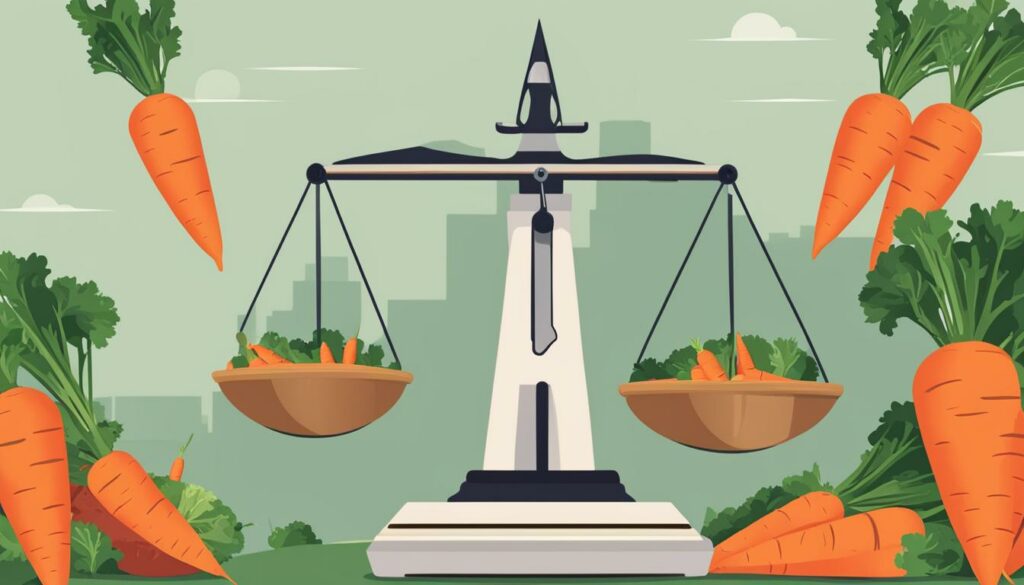When it comes to nutrition, carrots are often praised for their impressive health benefits. These vibrant root vegetables are not only delicious but also packed with essential nutrients and antioxidants that can contribute to your overall well-being.
From improving eye health to supporting heart health, carrots offer a wide range of advantages that make them a valuable addition to your diet.
Carrots are known for their high content of vitamin A and beta-carotene, which are essential for maintaining good vision. Additionally, these vegetables contain other nutrients like lutein and zeaxanthin, which further contribute to eye health. But the benefits of carrots go beyond just supporting your eyesight.
Key Takeaways:
- Carrots are rich in essential nutrients and antioxidants.
- They are beneficial for eye health, thanks to the vitamin A and carotenoids they contain.
- Eating carrots can help reduce the risk of cancer.
- They promote healthy skin, thanks to their carotenoid content.
- Carrots are a great addition to a weight management diet.
Boosts Eye Health
Carrots are often associated with improved vision and eye health due to their high vitamin A content. Just one cup of carrots provides 100% of the daily recommended intake of vitamin A.
Vitamin A, along with the carotenoids alpha-carotene and beta-carotene found in carrots, helps protect against age-related macular degeneration, night blindness, and other vision problems. Additionally, the antioxidants lutein and zeaxanthin in carrots contribute to overall eye health and protect the retina and lens.
| Nutrient | Amount |
|---|---|
| Vitamin A (retinol) | 100% of daily recommended intake |
| Alpha-carotene | 0.028 mg |
| Beta-carotene | 5.71 mg |
| Lutein + Zeaxanthin | 1.39 mg |
Reduces the Risk of Cancer
The antioxidants and phytochemicals present in carrots, such as beta-carotene, lycopene, and other carotenoids, have been linked to a reduced risk of various types of cancer. These compounds help inhibit the growth of cancer cells, boost immunity, and protect against oxidative damage.
Carrots are especially rich in beta-carotene, which has been associated with a lower rate of colorectal cancer. Studies have shown that individuals who consume a diet high in beta-carotene have a reduced risk of developing colorectal cancer compared to those with lower intake.
Additionally, carotenoids, a type of antioxidant found in carrots, have been studied for their potential in cancer prevention.
Carotenoids play a crucial role in neutralizing free radicals, which can cause DNA damage and lead to the development of cancer. By scavenging these free radicals, carotenoids help protect the body’s cells from oxidative stress and reduce the risk of cancer.
Research has also found that the phytochemicals in carrots can help prevent the growth and spread of cancer cells.
These phytochemicals work in various ways, such as inducing apoptosis (cell death) in cancer cells, inhibiting tumor cell migration and invasion, and suppressing angiogenesis (formation of new blood vessels that supply tumors).
To fully understand the impact of carrots on cancer prevention, let’s take a look at a comparative table showcasing the specific benefits of eating carrots:
| Type of Cancer | Benefit of Eating Carrots |
|---|---|
| Lung Cancer | Carrots contain antioxidants that protect against lung cancer formation and reduce the risk of developing the disease. |
| Colorectal Cancer | Carrots are rich in beta-carotene, which has been associated with a lower rate of colorectal cancer. |
| Prostate Cancer | Carrots are a valuable source of antioxidants and phytochemicals that help inhibit prostate cancer cell growth. |
| Leukemia | Phytochemicals in carrots have shown potential in suppressing the growth of leukemia cells and promoting cancer cell death. |
By incorporating carrots into your diet, you can take advantage of their cancer-fighting properties and contribute to your overall well-being.

Promotes Healthy Skin
Carrots are known for their beneficial effects on skin health. The carotenoids present in carrots, such as beta-carotene and other phytochemicals, contribute to improved skin appearance and may help reduce signs of aging.
These compounds act as antioxidants, protecting the skin from damage caused by free radicals. Regular consumption of carrots can help promote a healthy complexion and maintain youthful-looking skin.
The carotenoids found in carrots have been found to have several benefits for skin health. Beta-carotene, the most abundant carotenoid in carrots, is converted into vitamin A in the body, which is essential for skin regeneration and maintenance.
Vitamin A promotes the growth and development of skin cells, contributing to a smooth and glowing complexion.
Carrots also contain other carotenoids like lutein and lycopene, which help protect the skin from UV damage. UV rays from the sun can cause oxidative stress and premature aging of the skin.
The antioxidants in carrots help neutralize these harmful free radicals, reducing the risk of wrinkles, sun spots, and other signs of sun damage.
In addition to antioxidants, carrots are also rich in vitamin C, which plays a crucial role in collagen production. Collagen is a protein that provides structure and elasticity to the skin. Adequate collagen production helps maintain firmness and plumpness, giving the skin a more youthful appearance.
Furthermore, the high fiber content in carrots helps in detoxifying the body, eliminating toxins that can contribute to skin problems like acne and inflammation. A healthy gut and proper digestion are essential for healthy skin, and the fiber in carrots supports both.
Incorporating carrots into your diet is an excellent way to enhance your skin health from the inside out. Whether enjoyed as a crunchy snack, added to salads, or incorporated into various recipes, carrots offer a convenient and delicious way to nourish your skin.
Carrot-Inspired Skin-Boosting Smoothie Recipe:
- 1 cup carrots, chopped
- 1 cup mango, chopped
- 1/2 cup fresh orange juice
- 1/2 cup almond milk
- 1 tablespoon honey
- 1/2 teaspoon turmeric
Blend all the ingredients until smooth, and enjoy this refreshing and nutritious smoothie that promotes healthy skin.
| Carotenoid | Function |
|---|---|
| Beta-carotene | Converted into vitamin A, promotes skin cell growth and regeneration |
| Lutein | Protects the skin from UV damage |
| Lycopene | Reduces the risk of wrinkles and other signs of sun damage |
| Vitamin C | Boosts collagen production for firm and plump skin |
| Fiber | Supports gut health and aids in detoxification |
Aids in Weight Management
When it comes to weight management, carrots can be your best friend. Not only are they delicious, but they are also low in calories and high in fiber, making them an excellent choice for controlling your weight.
Carrots are considered a low-calorie vegetable, meaning they contain very few calories compared to their volume. This is great news for anyone looking to shed pounds or maintain a healthy weight. You can enjoy the satisfying crunch of carrots without worrying about adding excessive calories to your diet.
But it’s not just the low calorie content that makes carrots beneficial for weight loss. Carrots are also packed with fiber, which plays a crucial role in managing weight.
Fiber promotes a feeling of fullness, reducing hunger cravings and preventing overeating. When you consume carrots, the fiber expands in your stomach, creating a sense of satiety that can help you control your portions and avoid snacking on unhealthy, calorie-dense foods.
“Adding carrots to your diet can help you feel satisfied and reduce the temptation to indulge in unhealthy snacks or overeat.”
In addition to promoting fullness, the fiber content in carrots is also beneficial for regulating blood sugar and insulin levels. Fiber slows down the digestion of carbohydrates, preventing spikes in blood sugar and helping to stabilize energy levels throughout the day.
When your blood sugar levels are stable, you are less likely to experience energy crashes and cravings for sugary or high-calorie foods. This makes carrots a smart choice for maintaining consistent energy levels while aiming for weight loss or weight management.
Swap out your high-calorie snacks with raw or cooked carrots to save on calories and provide your body with essential nutrients. Carrots are a versatile vegetable that can be enjoyed on their own as a crunchy snack, added to salads for extra flavor and texture, or incorporated into various recipes.
Remember, weight management is not just about calorie intake but also about the overall quality of the food you consume. By including carrots in your diet, you are nourishing your body with a nutrient-dense, low-calorie option that can support your weight loss goals.

When it comes to weight management, incorporating carrots into your meals and snacks can make a significant difference.
Their low calorie content, high fiber content, and versatility make them an ideal choice for those looking to achieve and maintain a healthy weight. By making carrots a part of your regular diet, you can enjoy a flavorful and nutritious vegetable while supporting your weight loss efforts.
Supports Heart Health
Carrots offer several benefits for heart health. The potassium content in carrots helps regulate blood pressure and maintain a healthy heart. Potassium is an essential mineral that plays a key role in balancing electrolytes, controlling blood pressure, and promoting the normal functioning of the heart muscle.
The antioxidants and phytochemicals found in carrots, such as beta-carotene and lycopene, have been associated with a lower risk of cardiovascular diseases, including heart disease and stroke. These powerful antioxidants help neutralize harmful free radicals in the body, reducing oxidative stress and inflammation that can contribute to heart disease.
Carrots are not only delicious, but they also provide vital nutrients that support a healthy heart. Including carrots in your daily diet can be a simple and enjoyable way to reduce the risk of heart disease and improve overall cardiovascular health.
In addition to potassium and antioxidants, carrots are also a good source of fiber. A diet rich in fiber has been linked to a reduced risk of heart disease.
Fiber helps lower total cholesterol levels, especially LDL (bad) cholesterol, by binding to it in the digestive system and removing it from the body. By incorporating carrots into your meals, you can help promote healthy cholesterol levels and support overall heart health.
| Benefits of Eating Carrots for Heart Health |
|---|
| Regulates blood pressure |
| Reduces the risk of cardiovascular diseases |
| Provides antioxidants to reduce oxidative stress |
| Supports healthy cholesterol levels |
With their combination of potassium, antioxidants, and fiber, carrots make an excellent addition to a heart-healthy diet. Whether enjoyed raw, steamed, or roasted, incorporating carrots into your meals can provide numerous benefits for your heart and overall well-being.
Conclusion
Carrots are not only delicious and versatile, but they also offer a multitude of health benefits. Whether you prefer them raw or cooked, these vibrant root vegetables are packed with essential nutrients, antioxidants, and fiber that contribute to your overall well-being.
Incorporating carrots into your daily diet is an easy and enjoyable way to improve your health. Not only do they enhance vision and promote healthy skin, but carrots also aid in weight management and reduce the risk of cancer. The antioxidant properties of carrots support heart health and boost the immune system.
So, why not make carrots a regular part of your meals and snacks? Whether you enjoy them in salads, stir-fries, or as a crunchy snack, the health benefits of carrots make them a smart choice for anyone looking to improve their diet and well-being.
FAQ
What are the health benefits of carrots?
Carrots offer a wide range of health benefits including improved eye health, reduced risk of cancer, healthy skin, weight management, regulation of blood sugar levels, lower body mass index, and improved cardiovascular health.
How do carrots improve eye health?
Carrots are rich in vitamin A and carotenoids such as beta-carotene, which help protect against age-related macular degeneration, night blindness, and other vision problems. The antioxidants lutein and zeaxanthin in carrots also contribute to overall eye health and protect the retina and lens.
Can eating carrots reduce the risk of cancer?
Yes, the antioxidants and phytochemicals present in carrots have been linked to a reduced risk of various types of cancer including lung, colorectal, prostate, and leukemia. These compounds inhibit the growth of cancer cells, boost immunity, and protect against oxidative damage.
How do carrots promote healthy skin?
Carrots contain carotenoids like beta-carotene and other phytochemicals that contribute to improved skin appearance and may help reduce signs of aging. These compounds act as antioxidants, protecting the skin from damage caused by free radicals and promoting a healthy complexion.
Can carrots help with weight management?
Yes, carrots are low in calories and high in fiber, which promotes a feeling of fullness and reduces hunger cravings. The fiber content in carrots also helps regulate blood sugar and insulin levels, making them a good choice for stabilizing energy levels.
How do carrots support heart health?
Carrots contain potassium, which helps regulate blood pressure and maintain a healthy heart. The antioxidants and phytochemicals in carrots have also been associated with a lower risk of cardiovascular diseases, including heart disease and stroke. Additionally, the fiber in carrots helps lower cholesterol levels and promotes overall heart health.
Can carrots improve my overall well-being?
Absolutely! Incorporating carrots into your diet is a simple and enjoyable way to enhance your overall well-being. They provide essential nutrients, antioxidants, and fiber that contribute to improved vision, healthy skin, weight management, reduced cancer risk, enhanced cardiovascular health, a boosted immune system, and more!




